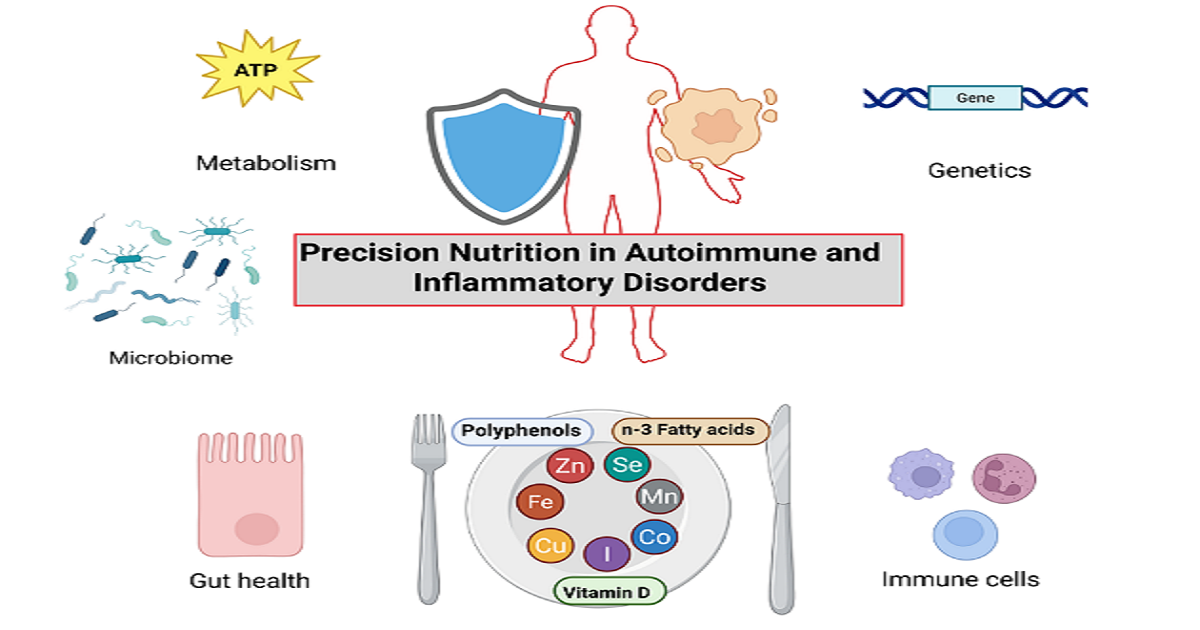Precision Nutrition in Autoimmune and Inflammatory Disorders
A special issue of Nutrients (ISSN 2072-6643). This special issue belongs to the section "Clinical Nutrition".
Deadline for manuscript submissions: 25 February 2026 | Viewed by 296

Special Issue Editors
Interests: minerals and trace elements; selenoproteins; hormones; endocrine feedback; thyroid gland; sexual dimorphisms; biomarkers; diabetes mellitus; inflammation; autoimmunity
Special Issues, Collections and Topics in MDPI journals
Interests: clinical nutrition; immunology; omics; autoimmune; allergy; metabolism
Special Issues, Collections and Topics in MDPI journals
Special Issue Information
Dear Colleagues,
Autoimmune and inflammatory disorders, such as rheumatoid arthritis, systemic lupus erythematosus, and multiple sclerosis, are closely linked to nutritional status. The practical application of a personalized approach, i.e., precision nutrition, based on genetics, metabolic needs, and immunological profiles, offers a promising strategy for managing these chronic disorders.
Recent research has highlighted the potential of dietary interventions to influence immune responses, decrease systemic inflammation, and improve quality of life. Among the specific nutrients and bioactive compounds are vitamin D, omega-3 fatty acids, polyphenols, trace elements, and anti-inflammatory dietary patterns. Addressing deficiencies in patients with chronic inflammation is essential for achieving optimal clinical outcomes.
The underlying concept of precision nutrition considers these compounds not as pharmacological agents, but as essential nutritional support needed for the regulated responses to inflammation and autoimmunity. When dysregulation occurs due to deficiency, often because of chronic inflammatory activity, certain biochemical pathways are impaired and immune responses are weakened. The aim is to restore the nutritional balance after identifying the specific needs by a personalized adjuvant targeted supplementation. The potential of precision nutrition is promising for patients, practitioners and researchers alike, but prevention, routine application and long-term patient adherence are the major challenges we are facing.
Prof. Dr. Lutz Schomburg
Dr. Mahsa Jalili
Guest Editors
Manuscript Submission Information
Manuscripts should be submitted online at www.mdpi.com by registering and logging in to this website. Once you are registered, click here to go to the submission form. Manuscripts can be submitted until the deadline. All submissions that pass pre-check are peer-reviewed. Accepted papers will be published continuously in the journal (as soon as accepted) and will be listed together on the special issue website. Research articles, review articles as well as short communications are invited. For planned papers, a title and short abstract (about 250 words) can be sent to the Editorial Office for assessment.
Submitted manuscripts should not have been published previously, nor be under consideration for publication elsewhere (except conference proceedings papers). All manuscripts are thoroughly refereed through a single-blind peer-review process. A guide for authors and other relevant information for submission of manuscripts is available on the Instructions for Authors page. Nutrients is an international peer-reviewed open access semimonthly journal published by MDPI.
Please visit the Instructions for Authors page before submitting a manuscript. The Article Processing Charge (APC) for publication in this open access journal is 2900 CHF (Swiss Francs). Submitted papers should be well formatted and use good English. Authors may use MDPI's English editing service prior to publication or during author revisions.
Keywords
- nutrition
- diet
- autoimmune diseases
- allergy
- chronic inflammation
- omics
- pathophysiology
- minerals
- trace elements
- selenium
- iodine
- zinc
Benefits of Publishing in a Special Issue
- Ease of navigation: Grouping papers by topic helps scholars navigate broad scope journals more efficiently.
- Greater discoverability: Special Issues support the reach and impact of scientific research. Articles in Special Issues are more discoverable and cited more frequently.
- Expansion of research network: Special Issues facilitate connections among authors, fostering scientific collaborations.
- External promotion: Articles in Special Issues are often promoted through the journal's social media, increasing their visibility.
- Reprint: MDPI Books provides the opportunity to republish successful Special Issues in book format, both online and in print.
Further information on MDPI's Special Issue policies can be found here.







